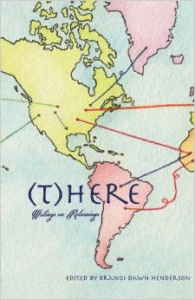 A Collection of Returning
A Collection of Returning
By: Brandi Dawn Henderson
(t)here represents a collection of 36 journeys, some fulfilled, some faithless, some accepting, some angry, others full circle, all deeply human and soul stirring. Daughters return to homelands to find life different, themselves having changed to the extent where, ultimately, they can no longer belong to one place. Men confront war and upon returning see how life just keeps going on while they are now alien, apart. People leave steady lives for adventure, long for steadiness, and then never find it again. Others think that the steadiness of a homeland they never had will fill in that missing slice of self. Searchers see beyond themselves and what they have always believed, and explorers confront the most challenging terrain of all – what makes us part of a place and how we define ourselves in relation to where we are and to where we can never be.
While (t)here is ostensibly a collection of essays about travel, editor Brandi Dawn Henderson has carefully selected each piece to represent more than a panorama of world geography. (t)here is a surprisingly complex book, psychological and painful, yet touching; through the pages we bond and merge with the souls who lay themselves open so eloquently, let us see what it is to be everything both bad and good in the context of what our world effectively shapes us to become. Each voice is different, yet haunting. I’ve never been much of a non-fiction person myself, and always avoided “true” books, but the premise was intriguing, so I gave (t)here a chance only to be surprised at how very open each story is, how each author rips away all self-protection and each entry leaves us thinking about travel but even more so about how we define ourselves in a confusing world.
Some stories are quite long, others short snippets, vignettes into another person’s life. The collection has something that will appeal to everyone – the traveler, the explorer, the dare-devil, the introvert, the thinker, the philosopher, and the seeker of modern literary writing.
Several particular entries from (t)here continue to stay with me. In “Of Times Less Frightening” author Ope Olum’degun talks of returning to his homeland of Nigeria and the constant fear, the strife as people cluster together in a church to sing, praising God, while waiting for the bombs to fall and the rebels to invade, showing a home country that has fear so grown into its substance that instability is the norm. Only now, going back, can the author see how this way of life has seeped in, been accepted, and it’s a chilling scene, an in medis reis dialogue that engages the reader as the prayers swell and fill the church.
In “Of Hijb and Short Skirts” author Yvette Neisser Moreno talks of her trip to Cairo and how dressing and walking, covering so much and then revealing so much in America makes her go beyond and think of how much we expose and how much stays hidden. An essay that works both psychologically and as an entertaining account of culture-shock, it remains with the reader and makes us wonder just what casual elements of deepest self do we have stamped on our outside, accessible to everyone.
Dario DiBattista’s “From Fallujah to Chili’s: A Reservist Goes Back to Work” combines the threads of daily, inconsequential life as seen before and after war. To add lingering melancholy, the piece makes mention of a flame haired woman the author lost and how such a gulf now separates them, even though they work at the same place and have similar outside lives. Where you go, what you see, changes you.
A tale that falls beyond the pall, Donna Girouard’s story “Going Home” reflects an ominous, supernatural tone as she returns to her dead mother’s house which is a lot more animate than readers suspect. The story reveals how places, even a childhood home, can be welcoming or unwelcoming and examines the theme of moving on while telling an especially unusual true-life story in an engaging manner. This particular entry was my favorite in the book, and I found myself mentally returning to the author’s image of herself, a grown woman, on a swing or sitting on All Hallows Eve with her tarot cards, searching for answers.
“A Life of Reverse Culture Shock” by Elizabeth Switaj is a heart-rending narrative of the author’s life as a woman with Asperger’s who has always been on the outside looking in. This essay in particular touches readers with how we can be somewhere, yet not be there, never receiving a welcome despite being physically present. This is one of those soul-stripping entries that leave readers introspective and thinking about the human condition, something this collection does on a surprising number of occasions.
While (t)here has stories of joy, stories of irritation, stories of travel and returns, it is mostly constructed of the deep raw pain that Henderson mentions in her own very personal forward – a book dedicated to the hardness we adopt to our hurting world and the effort and awareness it takes to shatter that protective cover. (t)here is a surprisingly thick anthology that will stay with you, make you laugh and cry, and ultimately and most importantly, make you think.
- Frances Carden
- Book Vs Movie: The Shining - April 6, 2020
- Thankful For Great Cozy Mysteries - December 13, 2019
- Cozy Mysteries for a Perfect Fall - October 20, 2019

Leave A Comment